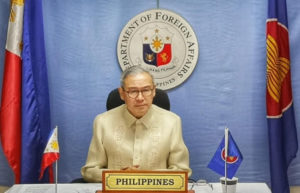MANILA, Philippines — Foreign Affairs Secretary Teodoro Locsin Jr. has pushed for a coordinated COVID-19 response by ASEAN member states and encouraged his counterparts in Southeast Asia about coming up with a regional recovery plan even while nations control the spread of the virus.
During the exchange of views on regional and international issues at the Informal ASEAN Foreign Ministers’ Meeting (IAMM) last June 24, Locsin said the recovery of nations from COVID-19 impacts “cannot wait.”
“I will not say ‘post-pandemic recovery plan.’ That connotes waiting for a vaccine or a cure still in the indeterminate future. The recovery cannot wait. It must begin even as we contain and reverse the contagion,” pointed out Locsin during the online meeting, which details were only made public by the Department of Foreign Affairs (DFA) on Wednesday, July 1.
Locsin highlighted the significance of integrated efforts to deal with the pandemic and cautioned against “protectionism.”
“ASEAN is the way. Rather than revert to protectionism, the instinctive response of most, opening up even with our comparative equality, we might wring out whatever commerce remains in the region and the world,” Manila’s top diplomat said.
Further, Locsin called for the protection of vulnerable sectors, such as migrants, and urged ASEAN member states to put up “stronger safeguards” against cyber crimes and other threats online as the world shifts to the digital economy necessitated by the “new normal” amid the crisis.
Two days after Locsin met with his fellow foreign ministers, President Rodrigo Duterte told his counterparts via teleconference during the 36th Asean Summit that a “cohesive” response to the pandemic “can help us safely navigate out of this storm of crisis.”
Duterte recognized that the pandemic uncovered the regional bloc’s limitations in terms of “healthcare and social protection system.”
“ASEAN has existing cooperation in these areas. Our task now is to recalibrate our plans so we can build back better,” the President said as he stressed the need to promote regional connectivity and sustainable supply chains, human resource development, and migrant workers’ rights.
The President also said it is imperative to “strengthen” the regional bloc’s capacity to address future infectious outbreaks through “research and capacity-building on health technology development.”
There are over 150,000 confirmed COVID-19 cases in Southeast Asia so far. In the Philippines, health officials have confirmed over 38,000 infections as of July 1.


